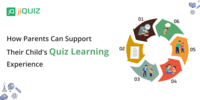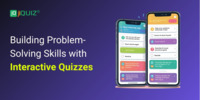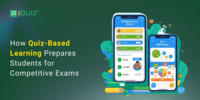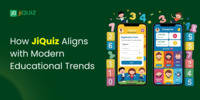- Jun 25, 2025
Share this post on:

Learning doesn't have to be a chore! In fact, turning educational concepts into fun, engaging activities is one of the most effective ways to help your child thrive. Quizzes, often associated with stressful tests, can be transformed into enjoyable learning games. They provide a low-pressure environment to review material, identify knowledge gaps, and build confidence. This blog post offers 20 fun quiz ideas designed to boost your child’s learning across different subjects and age groups. Let's ditch the test anxiety and embrace the quiz fun!
Why Quizzes are More Than Just Tests
Before we dive into the quiz ideas, let’s understand why quizzes are valuable learning tools:
- Reinforcement: Quizzes help reinforce what your child has already learned. Repeated exposure and application of knowledge solidifies understanding.
- Identify Knowledge Gaps: They quickly highlight areas where your child might be struggling or needs more review.
- Motivation & Confidence: Success in quizzes, even small ones, builds confidence and encourages further learning. Focus on effort and improvement, not just the score.
- Active Recall: Quizzes force children to actively recall information, which is a much more effective learning method than passive reading or listening.
- Engagement: A well-designed quiz can be surprisingly fun and engaging, making learning feel less like work.
Quiz Ideas for Every Age & Subject (with Adaptability Notes)
Here are 20 fun quiz ideas, categorized roughly by complexity and age appropriateness (though most can be adjusted). Remember to adapt the difficulty level to your child’s individual needs and interests.
1. Picture Matching (Ages 2-5): Print out pictures related to a topic (animals, shapes, colors) and have your child match them. This reinforces vocabulary and visual recognition.
2. "What Doesn't Belong?" (Ages 3-6): Present a group of objects or pictures, one of which doesn't fit the theme. This encourages critical thinking and pattern recognition. (Example: Apple, Banana, Carrot, Orange – Carrot doesn’t belong!)
3. Alphabet Scavenger Hunt (Ages 3-7): Hide objects around the room, each starting with a different letter of the alphabet. Your child finds them and says the word.
4. Color & Shape Identification (Ages 3-7): Simple quizzes asking your child to identify colors and shapes. Use flashcards or objects around the house.
5. Simple Math Fact Quizzes (Ages 5-8): Focus on addition and subtraction facts within 10. Use manipulatives (like beads or blocks) for visual learners.
6. Story Retelling Quizzes (Ages 5-9): After reading a story, ask questions about the plot, characters, and setting. Start with open-ended questions ("What happened first?") and progress to more specific ones.
7. Animal Sounds Quiz (Ages 4-8): Play the sounds of different animals and have your child guess which animal it is.
8. "True or False" Science Facts (Ages 6-10): Present simple science statements and have your child determine if they are true or false. (Example: “Fish can breathe underwater – True or False?”)
9. Multiple Choice Geography (Ages 7-12): Use simple geography questions about countries, capitals, and landmarks. (Example: "What is the capital of France? a) London b) Paris c) Rome")
10. Vocabulary Matching (Ages 7-14): Provide a list of words and their definitions (or pictures representing the words). Have your child match the words to their meanings.
11. "Finish the Sentence" Story Prompts (Ages 8-12): Start a sentence related to a specific topic or story and have your child finish it. This encourages creative thinking and language skills.
12. History Timeline Quiz (Ages 9-14): Present a series of historical events and have your child arrange them in chronological order.
13. Periodic Table Challenge (Ages 10+): For older children interested in science, a simplified periodic table quiz can be a fun way to learn about elements. Focus on common elements and their symbols.
14. Logic Puzzles (Ages 8+): Introduce simple logic puzzles like Sudoku or KenKen. These build problem-solving skills and critical thinking.
15. "What Am I?" Riddles (Ages 6+): Provide clues about an object or animal and have your child guess what it is. This encourages deductive reasoning. ("I have a long neck and eat leaves from tall trees. What am I?")
16. Character Traits Quiz (Ages 8+): After reading a book, ask questions about the characters' personalities and motivations. ("What kind of person is Harry Potter?")
17. Grammar & Punctuation Challenge (Ages 10+): Focus on basic grammar rules and punctuation. Provide sentences with errors and ask your child to correct them.
18. "Would You Rather...?" Ethical Dilemmas (Ages 10+): Present age-appropriate ethical dilemmas and ask your child to explain their reasoning. This encourages critical thinking and moral development.
19. Current Events Quiz (Ages 12+): Discuss current events and quiz your child on key facts and concepts. This helps them stay informed about the world.
20. "Build Your Own Quiz" (All Ages): The ultimate learning activity! Have your child create their own quiz on a topic they're passionate about. This reinforces their understanding and encourages creativity.
Tips for Making Quizzes Fun & Engaging
- Keep it Short: Especially for younger children, shorter quizzes are more effective.
- Use Visuals: Incorporate pictures, diagrams, and videos to make the quiz more engaging.
- Offer Choices: Allow your child to choose the topic or format of the quiz.
- Make it a Game: Use a timer, points system, or rewards to make the quiz more competitive and fun.
- Focus on Effort & Improvement: Praise your child's effort and progress, rather than just their score.
- Be Positive & Supportive: Create a positive and supportive learning environment.
- Adapt to Interests: Tailor quizzes to your child’s specific interests. A dinosaur-loving child will be more engaged with a dinosaur quiz than a general science one.
- Don't Overdo It: Keep quizzes occasional and enjoyable, not a source of stress.
Beyond the Quiz: Incorporating Learning into Daily Life
Remember, learning doesn’t have to be confined to quizzes. Incorporate learning into everyday activities:
- Cooking: Discuss measurements and fractions while baking.
- Shopping: Count items and compare prices.
- Nature Walks: Identify plants and animals.
- Travel: Learn about different cultures and landmarks.
Conclusion
Quizzes can be powerful tools for boosting your child’s learning, but only when approached in a fun and engaging way. By using these ideas and adapting them to your child’s interests and abilities, you can transform learning from a chore into an exciting adventure! Let’s ditch the test anxiety and embrace the quiz fun!









